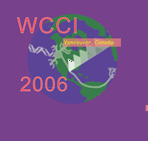
Swarm Intelligence
Congress on Evolutionary Computation 2006 (part of WCCI 2006), Vancouver, BC, Canada, from 16-21 July 2006
Organizers:
Dr. Xiaodong Li (RMIT University, Australia)
Dr. Yuhui Shi (EDS-Engineering and Manufacturing Services, USA)
Dr. Jürgen Branke (Institute AIFB, University of Karlsruhe, Germany)
Important dates
New submission
deadline:
February
14,
2006
Notification: March
15, 2006
Camera-Ready: April
15, 2006
Conference: June 16-21,
2006


Swarm Intelligence (SI) is an Artificial Intelligence technique involving the study of collective behaviour in decentralized systems. Such systems are made up by a population of simple agents interacting locally with one other and with their environment. Although there is typically no centralized control dictating the behaviour of the agents, local interactions among the agents often cause a global pattern to emerge. Examples of systems like this can be found in nature, including ant colonies, bird flocking, animal herding, honey bees, bacteria, and many more. Swarm-like algorithms, such as Particle Swarm Optimization (PSO) and Ant Colony Optimization (ACO), have already been applied successfully to solve real-world optimization problems in engineering and telecommunication. SI models have many features in common with Evolutionary Algorithms. Like EA, SI models are population-based. The system is initialized with a population of individuals (i.e., potential solutions). These individuals are then manipulated over many iteration steps by mimicking the social behaviour of insects or animals, in an effort to find the optima in the problem space. Unlike EAs, SI models do not explicitly use evolutionary operators such as crossover and mutation. A potential solution simply 'flies' through the search space by modifying itself according to its past experience and its relationship with other individuals in the population and the environment.
This special session will highlight the latest development in this rapidly growing research area of Swarm Intelligence. Authors are invited to submit their original and unpublished work in the areas including (but not limited to) the following:
-
Particle Swarm Optimization
-
Differential Evolution
-
Ant Colony Optimization
-
Culture algorithms
-
Other nature-inspired computation techniques
-
Multi-objective Optimization
-
Constrained Optimization
-
Optimization in Dynamic Environments
-
Swarm Intelligence models for evolving Neural Networks
-
Scheduling
-
Game Learning
-
Comparative studies of Swarm Intelligence models
-
Real world applications
Submission (New extended deadline: February 14, 2006)
You should follow the WCCI 2006 instructions of authors. A submission should not be over 8 pages. This includes all figures, tables, graphs, photos, and bibliography entries. Special session papers are treated the same as regular conference papers, and will be included in the conference proceedings. Please double check the as-printed appearance of your paper before submitting it.
Please note that you can submit your paper via the WCCI CEC'06 submission system, until Tuesday 14 February, 2006. On the "Main research topic" dropdown list, please select "Z2: Swarm Intelligence (Li, Shi, Branke)". This will allow your paper to be submitted to this special session for reviewing.
Organizers:
Dr. Xiaodong Li (xiaodong@cs.rmit.edu.au)
School of Computer Science and Information Technology
RMIT University, VIC 3001, Melbourne, Australia
Dr. Yuhui Shi (yuhui.shi@eds.com)
EDS-Engineering and Manufacturing Services 1401 E. Hoffer St.
Kokomo, IN 46902, USA
Dr. Jürgen Branke (jbr@aifb.uni-karlsruhe.de)
Institute AIFB, University of Karlsruhe
D-76128
Karlsruhe, Germany
Technical committee:
James Kennedy (US Department of Labour, USA)
Maurice Clerc (France Telecom, France)
Thomas Bartz-Beielstein (University of Dortmund, Germany)
Renato Krohling (University of Dortmund, Germany)
Andries P Engelbrecht (University of Pretoria Pretoria, South Africa)
Frans van den Bergh (University of Pretoria Pretoria, South Africa)
Chilukuri Krishna Mohan (Syracuse University, USA)
Xiaohui Hu (Purdue School of Engineering and Technology Indianapolis, USA)
Leandro dos Santos Coelho (Pontifical University Catholic of Paraná/PUCPR, Brazil)
Konstantinos E. Parsopoulos (University of Patras, Greece)
Michael N. Vrahatis (University of Patras, Greece)
Gerry Dozier (Auburn University, USA)
Mark Wachowiak (Robarts Research Institute, Canada)
Renata Smolikova (University of Western Ontario)
Xiaodong Li (RMIT University, Australia)
Yuhui Shi (EDS, USA)
Jürgen Branke (University of Karlsruhe, Germany)
Jonathan Fieldsend (University of Exeter, UK)